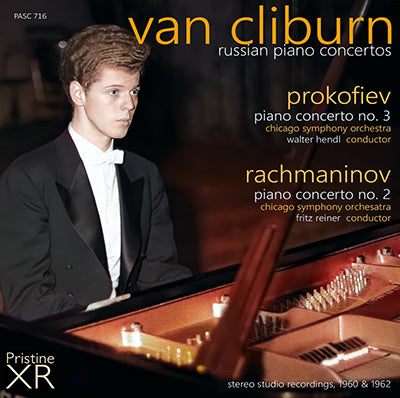
This album is included in the following sets:
This set contains the following albums:
- Producer's Note
- Full Track Listing
- Cover Art
1958 was a red-letter year for pianists. The first International Tchaikovsky Competition took place in Moscow and was won, unanimously and amid unprecedented publicity, by Van Cliburn of Texas. The Russians, who had designed the competition as a showcase for their own imperial talent were initially disgruntled, but dismay turned to awe and affection as they listened to a virtuoso whose massive tone worth its weight in gold - and romantic, free-wheeling temperament swept all before him . With characteristic bravado, jury member Sviatoslav Richter, ignoring rules and regulations, gave a hundred marks to Cliburn and zero to his rivals, baldly asserting, 'he's a pianist, the others are not'.
Today the legend of that occasion lingers on, a confluence of Cold War politics and art subsumed by Cliburn's magnetism. The late Irina Zaritzka (herself a prize-winner, taking second place to Maurizio Pollini in the 1960 Chopin Competition in Warsaw) was present. 'For us Russians his way with Tchaikovsky and Rachmaninov in particular was uncanny. Such grandeur, romantic warmth and empathy. He came close to sentimentality, but never quite crossed the line. His playing had an extraordinary nobility. You can't even imagine the furore he caused and his playing is still endlessly discussed in Russia today.'
The Russians were prepared for limitations they associated with American pianists: a cold, athletic brilliance that placed pianistic command first and musical and human quality a poor second; what has been unkindly called 'the American crew-cut school' and 'broken-glass sound'. Cliburn's broad tempi, rhapsody and freedom gave them both a joyful and rude surprise.
Back home a political as well as musical coup was celebrated. There was a ticker-tape Broadway parade, and record companies and managements battled for exclusive rights. Time magazine went to town, devoting a frontpage spread to their musical hero, describing him as 'Liberace and Horowitz all rolled into one, a gangling, blond six-footer as Texan as pecan pie'.
Soon after this brouhaha, unknown since the days of Liszt, Paganini and Paderewski, Kiril Kondrashin (Cliburn's partner in the finals of the competition) flew to the US - less easy in those protocol-ridden, pre-glasnost days - to collaborate in performances and RCA recordings of his two 'star' concertos, Tchaikovsky 1 and Rachmaninov 3. The Tchaikovsky beat Elvis Presley in the charts and became the best-selling disc in the history of classical LPs. Reissued on CD it remains of classic status: magisterially paced, tonally effulgent and - ironically, given the surrounding circumstances - of a pure, unsullied musicianship.
But if Cliburn's was 'a patriotic success' (Leontyne Price) it was also an international one. For here was music perceived as a moral force or intervention, a reminder of higher goods than political dissent or expediency. In a world riven by the Cold War possibility of nuclear Armageddon, Cliburn's triumph on what was essentially alien territory lit a torch of peace rather than aggression.
Bryce Morrison, Gramophone, 2004
VAN CLIBURN Russian Piano Concertos
PROKOFIEV Piano Concerto No. 3 in C, Op. 26
1. 1st mvt. - Andante. Allegro (9:46)
2. 2nd mvt. - Tema con variazioni (10:03)
3. 3rd mvt. - Allegro, ma non troppo (10:19)
Chicago Symphony Orchestra
conducted by Walter Hendl
RACHMANINOV Piano Concerto No. 2 in C minor, Op. 18
4. 1st mvt. - Moderato (10:58)
5. 2nd mvt. - Adagio sostenuto (11:27)
6. 3rd mvt. - Allegro scherzando (11:45)
Chicago Symphony Orchestra
conducted by Fritz Reiner
Van Cliburn, piano
XR remastering by Andrew Rose
Cover artwork based on a photograph of Van Cliburn
Prokofiev Concerto No. 3
Recorded 22 & 24 October, 1960
Orchestra Hall, Chicago
Rachmaninov Concerto No. 2
Recorded 31 March & 2 April 1962
Orchestra Hall, Chicago
Total duration: 64:18

